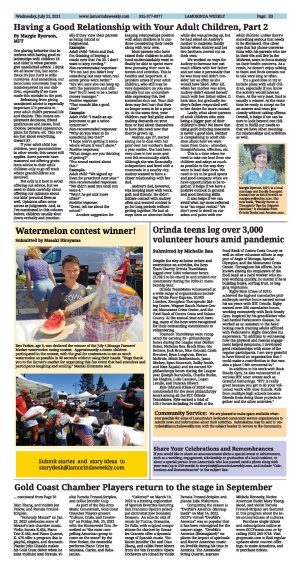| | Published July 21st, 2021
| Having a Good Relationship with Your Adult Children, Part 2
| | | By Margie Ryerson, MFT |  | | Margie Ryerson, MFT, is a local marriage and family therapist. Contact her at 925-376-9323 or margierye@yahoo.com. Her new book, "Family Focus: A Therapist's Tips for Happier Families," is available from Orinda Books and Amazon.com. |
One glaring behavior that interferes with having good relationships with children 18 and older is when parents give unsolicited advice. I think we all know this, but sometimes it's just hard to stifle ourselves. And sometimes, our innocuous comments may be misinterpreted by our children, especially if we have made this mistake in the past.
 Refraining from giving unsolicited advice is especially important if it pertains to your adult child's personal life and choices. This means employment decisions, friend preferences and issues, food choices, personal appearance, plans for future, etc. This covers just about everything, doesn't it?
Refraining from giving unsolicited advice is especially important if it pertains to your adult child's personal life and choices. This means employment decisions, friend preferences and issues, food choices, personal appearance, plans for future, etc. This covers just about everything, doesn't it?
 If your adult child has children, your grandchildren in other words, this caveat still applies. Some parents have mastered not offering gratuitous advice to their adult children only to go off track where grandchildren are involved.
If your adult child has children, your grandchildren in other words, this caveat still applies. Some parents have mastered not offering gratuitous advice to their adult children only to go off track where grandchildren are involved.
 Not only is it best to avoid offering our advice, but we need to think carefully about offering our opinions about our kids' personal lives as well. Opinions often come across as judgments. And, as I've mentioned in this column before, children usually shut down verbally and emotionally if they view their parents as being critical or judgmental.
Not only is it best to avoid offering our advice, but we need to think carefully about offering our opinions about our kids' personal lives as well. Opinions often come across as judgments. And, as I've mentioned in this column before, children usually shut down verbally and emotionally if they view their parents as being critical or judgmental.
 Example:
Example:
 Adult child: "Mom and Dad, I'm thinking of buying a condo now that I'm 30. I don't want to keep renting."
Adult child: "Mom and Dad, I'm thinking of buying a condo now that I'm 30. I don't want to keep renting."
 Non-recommended responses:
Non-recommended responses:
 "It's too bad you didn't buy something last year when real estate prices were better."
"It's too bad you didn't buy something last year when real estate prices were better."
 "Are you sure you can keep up with the payments and utilities? You'll need to be a better money manager."
"Are you sure you can keep up with the payments and utilities? You'll need to be a better money manager."
 Positive response:
Positive response:
 "That sounds like a good idea!"
"That sounds like a good idea!"
 Example:
Example:
 Adult child: "I made an appointment to get a tattoo tomorrow."
Adult child: "I made an appointment to get a tattoo tomorrow."
 Non-recommended responses:
Non-recommended responses:
 "Why do you want to do something like that?"
"Why do you want to do something like that?"
 "I hope you're getting it somewhere where it won't show."
"I hope you're getting it somewhere where it won't show."
 Positive responses:
Positive responses:
 "What design are you thinking of getting?"
"What design are you thinking of getting?"
 "You sound excited about this."
"You sound excited about this."
 Example:
Example:
 Adult child: "We signed up Evan for preschool next year."
Adult child: "We signed up Evan for preschool next year."
 Non-recommended responses:
Non-recommended responses:
 "We didn't send you until you were 4."
"We didn't send you until you were 4."
 "Won't he get sick more often?"
"Won't he get sick more often?"
 Positive response:
Positive response:
 "Great, tell me about the school."
"Great, tell me about the school."
 Another suggestion for keeping relationships positive with adult children is to continue considering their needs along with your own.
Another suggestion for keeping relationships positive with adult children is to continue considering their needs along with your own.
 Most parents who have raised their children to adulthood understandably want to finally be able to spend more time pursuing their own interests and activities. This is healthy and important. A problem arises if your adult children, who still may be very dependent on you emotionally but are uncomfortable expressing this, feel somewhat shut out. Your children may feel hurt that they no longer seem to be a priority. At the same time, your children may feel guilty about making demands on your time or bad about themselves to have this need now that they're grown up.
Most parents who have raised their children to adulthood understandably want to finally be able to spend more time pursuing their own interests and activities. This is healthy and important. A problem arises if your adult children, who still may be very dependent on you emotionally but are uncomfortable expressing this, feel somewhat shut out. Your children may feel hurt that they no longer seem to be a priority. At the same time, your children may feel guilty about making demands on your time or bad about themselves to have this need now that they're grown up.
 Audrey, age 27, started seeing me to deal with her grief over her mother's death a year earlier. She had been very close to her mom and now felt emotionally adrift. Although she was financially independent and lived with a roommate in a nearby city, Audrey wanted to have a closer relationship with her dad.
Audrey, age 27, started seeing me to deal with her grief over her mother's death a year earlier. She had been very close to her mom and now felt emotionally adrift. Although she was financially independent and lived with a roommate in a nearby city, Audrey wanted to have a closer relationship with her dad.
 Audrey's dad, however, was keeping busy with work, golf, and friends. He didn't initiate contact with Audrey often and seemed content to go for long periods without getting together. He had always been an attentive father while she was growing up, but he had relied on Audrey's mother to maintain family bonds when Audrey and her two brothers moved out on their own.
Audrey's dad, however, was keeping busy with work, golf, and friends. He didn't initiate contact with Audrey often and seemed content to go for long periods without getting together. He had always been an attentive father while she was growing up, but he had relied on Audrey's mother to maintain family bonds when Audrey and her two brothers moved out on their own.
 We worked on ways for Audrey to increase her outreach efforts with her father and not take it personally that he was busy and didn't consider her as often as she would have liked. After all, when her mother was alive, Audrey didn't extend herself much with her father either. It took time, but gradually Audrey's father responded well to her desire for more contact.
We worked on ways for Audrey to increase her outreach efforts with her father and not take it personally that he was busy and didn't consider her as often as she would have liked. After all, when her mother was alive, Audrey didn't extend herself much with her father either. It took time, but gradually Audrey's father responded well to her desire for more contact.
 Lastly, what about parents of adult children who miss being a bigger part of their children's lives? We know that using guilt-inducing measures is never a good idea. Neither is complaining to adult children about how we want more from them - attention, thoughtfulness, affection, etc.
Lastly, what about parents of adult children who miss being a bigger part of their children's lives? We know that using guilt-inducing measures is never a good idea. Neither is complaining to adult children about how we want more from them - attention, thoughtfulness, affection, etc.
 This is a time when we need to take our lead from our children and adapt as much as possible to the way they want to lead their lives. We need to try to be good sports and good company when we have opportunities to be together. It helps if we have a positive outlook in general and good listening skills.
This is a time when we need to take our lead from our children and adapt as much as possible to the way they want to lead their lives. We need to try to be good sports and good company when we have opportunities to be together. It helps if we have a positive outlook in general and good listening skills.
 It also helps if we can avoid what my mom referred to as "an organ recital." We don't need to dwell on our aches and pains with our adult children unless there's something serious that needs to be discussed. One client says that his phone conversations with his parents who are in their 60s and live in the Midwest, seem to focus mainly on their health concerns. As a result, he doesn't enjoy talking to them and finds excuses not to talk very long or often.
It also helps if we can avoid what my mom referred to as "an organ recital." We don't need to dwell on our aches and pains with our adult children unless there's something serious that needs to be discussed. One client says that his phone conversations with his parents who are in their 60s and live in the Midwest, seem to focus mainly on their health concerns. As a result, he doesn't enjoy talking to them and finds excuses not to talk very long or often.
 It's a good idea to try to initiate plans with adult children, especially if you know the activity would interest them. At the very least, food is usually a winner. At the same time be ready to accept no for an answer and react graciously without taking offense. Overall, it helps if we can be sure to look beyond our children to fulfill our needs so that we have other meaningful relationships and activities as well.
It's a good idea to try to initiate plans with adult children, especially if you know the activity would interest them. At the very least, food is usually a winner. At the same time be ready to accept no for an answer and react graciously without taking offense. Overall, it helps if we can be sure to look beyond our children to fulfill our needs so that we have other meaningful relationships and activities as well. |
| | | | | | | | | | | | |



